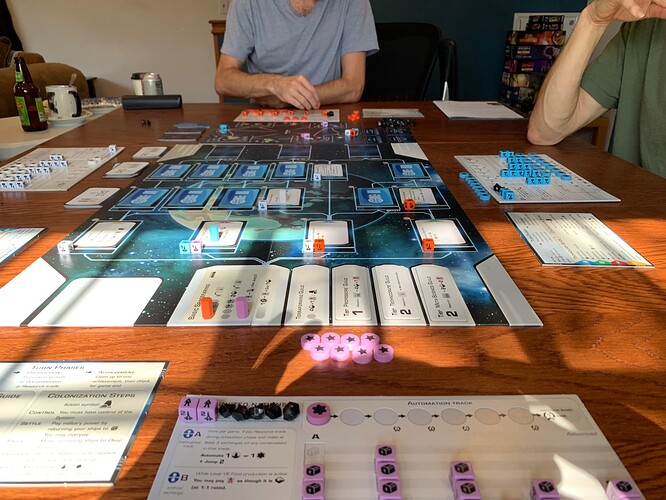@Spock, in the “What you played in September” thread, asked me about my boardgame of the month, City of Kings. Rather than derail that thread, I thought I’d reply here.
I’m not sure what he means by this. But I don’t play as many games as he does, so maybe that’s why. The theme, as I see it, is threats against a major city, and the characters venture out to confront those threats. My one criticism in terms of the theme is you really don’t get a sense of the city itself, only the lands beyond. Also, keep in mind that this is, at its core, a puzzler more than an RPG-ish crawler. The story is minimal.
Each character has special skills that you acquire as you level up, and those skills are unique to each character. Otherwise, yes, they are similar in terms of their basic stats and abilities.
Yes, it is absolutely random, and I really love that. Every time a creature activates, you draw tiles from one of three bags (depending on difficulty of the monster) to get its abilities. (Some creatures also have set abilities in addition to the ones that are drawn). The sorts of effects those abilities can cause are pretty wide ranging, they’re not just various ways to ding the players. It adds a feeling of chaos to the game, and forces you to constantly adapt your strategies on the fly. I love pulling those tiles out the bag and finding out what shit I now have to face.
True for the base monsters, but the boss monsters have real portraits on their cards and standees. This was probably a budget thing.
Well, you start out with a basic damage stat that is unaffected by any luck whatsoever. It’s symbol is a sword! There are advanced items that you purchase later on in the city or at a remote shop, once you’ve accumulated sufficient resources. Those items include weapons and apparel for legs, body and head that boost your stats. Pretty standard approach.
As noted above, I enjoy this, it adds chaos. Every play is different. Which is part of the reason that every time I finish (win or lose) a scenario, I want to try it again.
Agree, as you’ve seen from my responses, those mostly are pluses in my book. I also enjoy the worker gathering resources element. Lots of meaty decisions on each turn.
I got it a few weeks ago in a local game swap event. I lucked out – gave up an old copy of the base game of Sentinels of the Multiverse and $25 for CoK. Barter!
Keep in mind there are various editions floating around. The KS edition has overlays to keep your tracking cubs aligned; mine does not. You might find a good used copy on BGG. Hope that helps. Here’s a good overview from the publisher.
